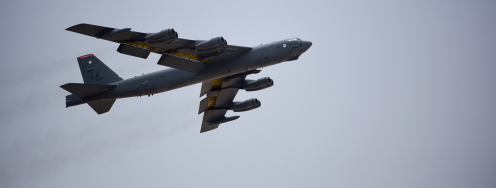Iran Talks Extended: Outlook and Early Analysis
On the radar: JPOA extended to November; Iran eliminates sensitive stockpile; Looking ahead; Ashton to stick around; Congress needs to be part of the solution; the Anti-diplomacy lobby; Polling Trident; and Legislators threaten New START.
July 21, 2014 | Edited by Lauren Mladenka and Geoff Wilson
Worth the wait - “In a world rife with intractable conflicts, it's something of an oddity that negotiations to end a uniquely menacing threat have percolated quietly, making progress that just a few months ago seemed far beyond reach,” writes USA Today in an editorial. “Now those talks will continue for four more months.”
--“The extension, signaled by both sides in recent days, was expected. But the muted reaction of skeptics, who see total capitulation by Iran as the only option, was telling. Their alarmist predictions that easing sanctions would be disastrous have proved false, as have their dire warnings that Iran would cheat while negotiations continued. By all accounts, Iran is complying.”
--“One thing should be clear — at least to reasonable observers: Any agreement in which Iran abandons nuclear weapons would be an astounding achievement, one that could lead to a reassessment of the caustic U.S.-Iran relationship. It would avoid a nearly certain nuclear arms race in the Middle East, not to mention an equally likely U.S. war with Iran prompted by an attack on Iran's nuclear facilities.” Read the full piece here. http://usat.ly/1yPPhJ5
Tweet - @BrookingsInst: Uranium enrichment remains a major divide in #Iran nuclear talks. Robert Einhorn explains a possible way forward: http://bit.ly/1ruU15V
Carrot or stick - “Behind President Obama’s decision on Friday to extend the Iran nuclear negotiations for four more months is a calculation that the administration has the mix of pressure and incentives just about right: That by keeping the most damaging sanctions, but giving Tehran a taste of what access to its overseas cash reserves might mean, a deal is possible…Mr. Obama will win this argument in the short term. The four-month extension is not long enough for Congress to take decisive action, and Mr. Obama has signaled that he would veto more sanctions. But over the longer term, administration officials know they have a deeper problem. No agreement with Iran is going to have the kind of guarantees Congress has demanded to prevent Tehran from producing a weapon.”
--“History suggests no such guarantees are possible; there are simply too many other pathways for a determined country to get a weapon. Yet if a deal were struck, ultimately Mr. Obama would most likely have to persuade Congress to reverse the sanctions against doing business with Iran that have been piling up for more than a decade.” Read the full analysis from David Sanger for The New York Times here. http://nyti.ms/UmDuSX
Stockpile eliminated - “Iran has moved to eliminate its most sensitive stockpile of enriched uranium gas under an interim nuclear deal reached with six world powers last year, according to a monthly update by the U.N. nuclear watchdog obtained by Reuters on Sunday. The report by the International Atomic Energy Agency (IAEA) showed that Iran had met the terms of the six-month agreement, under which it limited its atomic activities in exchange for some easing of sanctions that are crippling its economy.”
--“The IAEA update also showed that Iran had started up a long-delayed facility to convert some of its lower-grade enriched uranium gas into oxide and had fed about 1,500 kg of the material into the conversion process, as agreed in November. Western experts say it would take more time to make a bomb from uranium oxide than from gas, lowering any risk of a quick breakout for a nuclear weapon.” Fredrik Dahl has the full story in Reuters. http://reut.rs/UkfU9v
Extension is an opportunity - “Diplomats working for a negotiated end to Iran's nuclear program say they need a little more time,” writes Joe Cirincione for USA Today. “We should give it to them. Talking longer to close the remaining gaps and secure a lasting deal is certainly better than letting the talks collapse.”
--“The goal was to reach a final deal by Sunday. Negotiators are close, but not quite there yet. A short extension of the talks is a win/win: Iran's nuclear program will remain frozen in place, as it has been since the negotiations began, and on-site inspections of their facilities will continue.” Full piece here. http://usat.ly/UhSAcu
Keep talking - “This is an opportunity we can’t forgo. Diplomacy must be given the chance to succeed, lest we live with the probable consequences of failure: an Iranian nuclear weapon or another disastrous war,” write Brig. Gen. John Johns and Angela Canterbury for CNN.
--“We’ve come a long way toward our goal of preventing an Iranian nuclear bomb. But we need a long-lasting agreement. And to achieve that, we must keep Iran at the table. It’s reasonable that negotiators need more time to settle on the details of what will undoubtedly be an extremely complicated settlement. And Iran’s compliance thus far suggests that its leadership is committed to this process, and that extending the talks offers real hope for success.” Full piece here. http://cnn.it/1qWLpBd
Not changing horses - “European Union’s foreign policy chief, Catherine Ashton, will remain the chief nuclear negotiator of six world powers in the course of nuclear talks with Iran after her tenure expires in the European Union,” Press TV reports. Get the full story here. http://bit.ly/1tq5Fgm
Failure not an option - “While differences on key issues remain, progress has been achieved and an agreement is within reach if both sides remain focused and engage in creative, smart diplomacy. It is important at this critical stage in the process for policymakers in Washington to support the administration’s ongoing efforts at reaching a diplomatic solution, even if more time is needed to reach a good agreement that guards against a nuclear-armed Iran,” writes Kelsey Davenport in Roll Call.
--“Failure to reach a good agreement is not an option. Some on Capitol Hill argue that a ‘bad deal is better than no deal.’ In reality, a good deal is better than no deal, and a good deal is, with more time, still within reach. So Congress needs to do its part to help bridge those gaps — namely by supporting negotiations and an extension, not jeopardizing the prospects for a good deal with unreasonable demands.” Full article here. http://bit.ly/1yQ4mdD
Lessons to learn - “War with an industrial power and nuclear technology developed under military rule doesn’t preclude a country from enriching uranium. Just ask Argentina,” writes Jonathan Tirone for Bloomberg. “As world powers reached an impasse with Iran over the Persian Gulf country’s nuclear work, Argentina said it will become just the 11th nation to begin large-scale enrichment of the heavy metal used for industrial, medical and energy applications. It’s been producing enriched uranium on an experimental scale since the 1980s.”
--“Diplomats who haggled with Iran for 16 days in Vienna were hesitant to apply lessons from Argentina’s nuclear rehabilitation following its defeat by the U.K. in the 1982 Falkland War and subsequent transition to civilian rule. Nuclear dilemmas the globe is facing in Argentina and Iran are Sui Generis, or unique unto themselves, said a U.S. official at the Iran talks who asked not to be named.” Full story here. http://bloom.bg/1rvLEXN
Behind the curtain - “Within Washington’s corridors of power, the institution that has done the most to focus attention on the alleged Iranian nuclear threat—Congress—has also been among the most skeptical when it comes to using diplomacy to do anything about it. But the members of Congress don’t come up with these ideas on their own. A handful of organizations...do most of the legwork in shaping policy. An even smaller network of right-wing donors funds these groups.” Read the full report from Eli Clifton and Ali Gharib for The Nation here. http://bit.ly/1sESlHo
Tweet - @DefenseOne: This scientist says that the Iron Dome’s success rate is completely overrated http://bit.ly/1qwFuac
Trident poll - “A new poll shows that pro-independence Scots are gaining ground against unionists, which has implications for the future of the U.K. nuclear arsenal,” Global Security Newswire reports. “In a survey of 995 voting-age Scots, support for seceding from the United Kingdom had risen by two points in the last month and was now 32 percent, Reuters reported. The side supporting remaining part of the United Kingdom saw its standing dip by one point, falling to 41 percent.”
--“The locally governing Scottish National Party has promised to make the removal of all British nuclear weapons from Scottish territory one of its first orders of business in a potential independent Scotland. Notably, though, a previous poll showed greater support among Scottish voters for allowing the nuclear arsenal to remain in Scotland than expelling it.” Full article here. http://bit.ly/1mwcuap
Bluster - “Upset about new U.S. sanctions, some Russian lawmakers think their government should unilaterally pull out of the New START arms control pact,” Global Security Newswire reports.
--“Russian lawmakers are not the only ones who want to see New START suspended. The U.S. House of Representatives in May approved legislation that seeks to deny the Defense Department funding to carry out treaty-mandated arms reductions.” Full piece here. http://bit.ly/1p7jLBQ
Quick-hits:
--“Iran nuclear talks: Is a comprehensive deal still on the table?” by Scott Peterson in The Christian Science Monitor. http://bit.ly/1yPwU6Y
--“Iran Foreign Minister Javad Zarif: ‘It’s a historic opportunity for all of us’” by Mick Krever for CNN. http://cnn.it/1pvdDC3
--“Can Iran Be Deterred from Going Nuclear?” by Zachary Keck in The National Interest. http://bit.ly/1k8ibBb
Events:
--“Progressive National Security in the 2014 Elections and Beyond.” Netroots Nation discussion with Ploughshares Fund President Joe Cirincione, Mike Darner, and Megan Minnion; moderated by Emily Cadei. July 19 from 1:30 to 2:45 at COBO Center, Room 140 D, 1 Washington Blvd., Detroit, MI. RSVP here. http://bit.ly/1jtO5rr
--“Iran’s Nuclear Chess: Calculating America’s Moves.” Discussion with Robert Litwak, Mitchell Reiss, and David Sanger. July 21 from 12:00 to 1:15 at the Wilson Center, 5th floor, Reagan building, 1300 Pennsylvania Ave. NW. RSVP here. http://bit.ly/1oVD4hv
--“The Future of WMD in 2030.” Off the record discussion with John Caves and Seth Carus. July 24 12:00 to 1:30 at the National Defense University, Lincoln Hall, Room 1119, Fort McNair, Washington. RSVP by email to Nima Gerami at nima.gerami@ndu.edu.
--“Nuclear Politics on the Korean Peninsula.” Discussion with seven speakers. July 28 from 3:00 to 5:15 at the Carnegie Endowment for International Peace, 1779 Massachusetts Ave. NW. RSVP here. http://ceip.org/1sTSpjA
--“Hiroshima Peace Commemoration.” Sponsored by the DC Hiroshima-Nagasaki Peace Committee. August 5 at 6:30 at the Martin Luther King, Jr. Memorial, 1964 Independence Ave., SW, Washington.
--“The Nuclear Zero Lawsuits: Why the Tiny Marshall Islands Took on the Nuclear Nine.” Discussion with Rick Wayman, Neisen Laukon, and Erica Fein. August 6 from 3:00 to 4:00. Registration for online webinar available here. http://bit.ly/1k8nf8p



